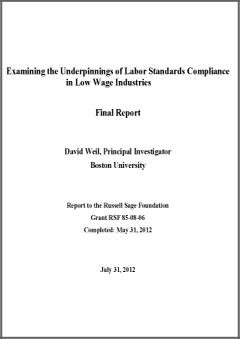Main navigation
 In 2008, the Foundation funded a study on the relationship between compliance with federal labor compliance standards and three factors that may influence firm behavior: branding, franchising, and third-party management contracting. David Weil, the project's principal investigator, studied two industries—the fast food and hotel/motel sectors—and found that "these practices have significant effects on workplace compliance with labor standards." Here are the key findings from his final grant report:
In 2008, the Foundation funded a study on the relationship between compliance with federal labor compliance standards and three factors that may influence firm behavior: branding, franchising, and third-party management contracting. David Weil, the project's principal investigator, studied two industries—the fast food and hotel/motel sectors—and found that "these practices have significant effects on workplace compliance with labor standards." Here are the key findings from his final grant report:
• Franchising affects compliance with labor standards. Within branded establishments using franchising (e.g. fast food restaurants like Burger King), establishments that are directly owned by the brand (company-owned) have higher rates of compliance than comparable outlets that are franchised owned. Franchisees have significantly larger levels of noncompliance, measured in a variety of ways. These results were particularly strong in the fast food industry, an industry with one of the longest histories of franchising.• Third party management of properties is widespread and adversely affects compliance. Third party management of enterprises, where an establishment/workplace is owned by one entity and managed by another, creates complicated agency relationships, further obfuscating the employer/employee relationship. It is widely found in the hotel/motel industry, creating complicated joint employment relationships with owners. Brands also impose standards on the practices of hotel properties, further complicating the forces governing workplace practice. As a result, we find complex relationships between ownership, third-party management and compliance.
• Brands tend to have better compliance than non-branded businesses. Branding is a central component of firm strategy and profitability. This creates significant incentives to protect brand equity relative to businesses without brands (hotel/motel study). The interest of brands in quality and reputation (their core competency) leds to differences in relative compliance and can improve the ability to improve compliance at the workplace level.
You can read the full report here. Other publications related to this project can be found here.





